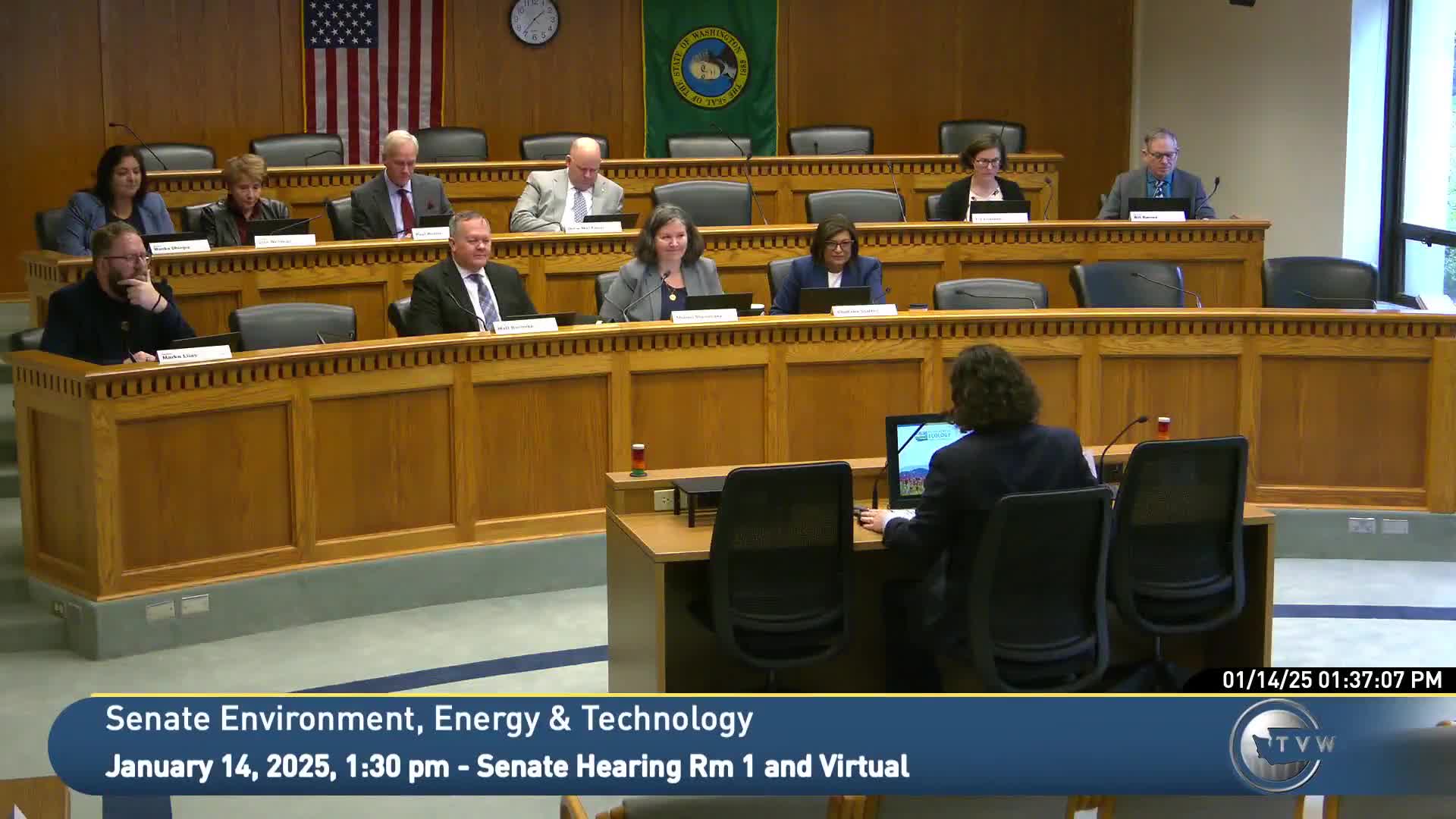Department of Ecology briefs Senate panel on agency priorities; seeks delay to solar-panel takeback rule
Get AI-powered insights, summaries, and transcripts
Subscribe
Summary
The Department of Ecology told the Senate Environment, Energy & Technology Committee that it manages 11 environmental programs, a nearly $3 billion budget and has two agency-request bills: a delay and work group for the solar-panel takeback program and a bill to align wood-stove emissions standards with federal rules and add oversight.
The Senate Environment, Energy & Technology Committee received a department-wide briefing from the Washington State Department of Ecology during its meeting, where the agency outlined its programs, priorities and two agency-request bills for the 2025 regular session.
Adam Eitman, director of governmental relations for the Department of Ecology, told the committee the agency employs roughly 23,100 full‑time staff and manages nearly $3,000,000,000 in capital, market and state general funds to carry out 11 environmental programs and three statutory offices.
The briefing focused on the agency’s budget and program structure, ongoing priorities and two agency-request bills Eitman said would be offered by the committee chair. "One of them deals with the solar panel take back program…this bill is going to request a delay in the implementation of this program while the department is directed to convene a work group," Eitman said. He described the second bill as aligning state and federal wood‑stove emissions standards and adding oversight to ensure consumer confidence in stove performance.
Why it matters: Ecology oversees statewide pollution prevention, cleanup and water resource programs that affect local governments, utilities, industry and households. Changes to the solar-panel takeback rules would affect producers and product‑stewardship programs; wood‑stove changes touch air‑quality rules and consumer protections in areas where residential wood heating is common.
Agency scope and priorities
Eitman summarized Ecology’s program areas, which include air quality, the new Climate Pollution Reduction Program (responsible for the state’s cap‑and‑invest and related regulations), environmental assessment and laboratory accreditation, hazardous waste and toxics reduction (including PFAS and product‑stewardship work), nuclear‑waste oversight at the Hanford site, shorelands and shoreline permits, solid‑waste management and spill response, toxics cleanup, water quality permitting and water resources (including water‑rights work and dam safety). He also described three offices: the Office of the Columbia River, the Office of the Chehalis Basin, and the Office of Equity and Environmental Justice, which leads implementation of the "healthy environment for all" work.
Eitman told the committee Ecology is seeking new investments to address emerging toxic chemicals, naming 6PPD and PFAS as priorities, and to continue implementation of previously enacted climate policy. He said Ecology will also support priorities from the state’s salmon‑strategy update and environmental restoration work groups.
Regional structure, headquarters and leadership
Eitman said Ecology is headquartered in Lacey with full regional offices in Shoreline, Lacey, Union Gap and Spokane and additional field offices in Richland, Vancouver and Bellingham. He said Director Laura Watson was concluding her service and that the governor‑elect has announced a successor who previously served as the U.S. Environmental Protection Agency’s Region 10 administrator; Ecology will provide introductions and staff contact points as leadership transitions.
Program details cited
Eitman described specific programs and regulatory work: air‑quality permitting and wood‑stove enforcement; climate programs including the cap‑and‑invest program and low‑carbon fuel and clean‑truck regulations; environmental lab accreditation and research on 6PPD; the state’s hazardous‑waste and safer‑products work (including the Child Safe Products Act and efforts on PFAS and AFFF firefighting foam); Hanford tri‑party cleanup work; shoreline master planning and floodplain grants; solid‑waste stewardship (including e‑cycle, battery stewardship, paint care and the emerging solar‑panel recycling issue); spill response and marine traffic studies; toxics cleanup and underground storage‑tank regulation; 401 water‑quality certifications and the Puget Sound nutrients general permit; and water‑rights, streamflow and dam safety work, including the Yakima Basin Integrated Plan.
Committee exchange on programmatic environmental review
Senator Marco Lias asked whether Ecology’s programmatic environmental impact statements (EISs) for wind and utility‑scale solar could serve as a model for other clean‑energy or transition technologies such as hydrogen or sustainable aviation fuel. Eitman replied that Ecology’s programmatic work on wind and solar is "further along" than hydrogen work and that programmatic EISs can be useful to identify areas and potential impacts early, reduce permitting uncertainty and provide a clearer path for project siting and mitigation.
Next steps
Eitman said the two agency‑request bills will be presented by the committee chair and that Ecology staff will follow up with committee members and staff. He also identified Ken Camp as acting director of governmental relations while the agency recruits for the position.
The committee did not take any formal votes during the briefing. Eitman and staff offered to provide additional program contacts and technical materials on request.
